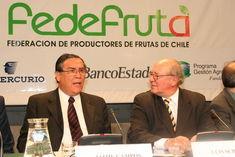
Chile’s horticultural production will suffer if unfavourable exchange rates continue, according to Luis Schmidt, president of the country’s fruit growers’ association Fedefruta.
Schmidt told delegates celebrating Fedefruta’s 20th anniversary at its annual convention last week the low exchange rate with the US dollar in recent years could not be endured long-term.
He said: “The current level is not sustainable in our activity, like many others. It is negative in terms of investment and employment for future industry. If this situation continues there will be a decrease in labour for our sector.”
Schmidt claimed the recent free trade agreement with China was a positive step for the industry and Fedefruta would continue to support the ministers of agriculture and foreign affairs in their pursuit of entry into additional markets, such as India and Korea.
Jaime Campos, Chile’s minister for agriculture said the industry needed to take further action, however.
“It is not enough to rely on the free trade agreements. Because of the complexity of the terms of these agreements, in terms of phytosanitary specifications, we need to do more in making Chilean fruit a synonym for quality fruit,” he said.
Post-harvest technology was one area on which both speakers urged the industry to focus, in the bid for long distance trade. Transparency and information sharing between producers, exporters, ministers and researchers, was another.
Campos acknowledged this would require significant investment both at a farming and packing level but claimed the industry should regard it as an “enormous opportunity rather than as a bar to free trade,” and a chance to demonstrate Chile’s dominance in Latin American agriculture.
Innovation would be key in setting Chile apart from other Southern Hemisphere producers, Schmidt added.
To this end Fedefruta has invested in a business incubator for the sector, SABIO, in association with the university of Chile and the National Agricultural Association (SNA).
The incubator aims to provide financial and physical support for fledgling companies in launching projects of benefit to the industry.
Despite the urgent plea for action both speakers agreed the industry had made great progress since the inauguration of the association, and had the potential to build on this success enormously in the future.
Schmidt said: “In 1985 Chile exported 5.3 million boxes, or $355m. Now we are exporting 230m boxes, or $2 billion, an increase of six times.”
Campos added that the time for Chile to triumph as an agro-economic superpower was in reach.



